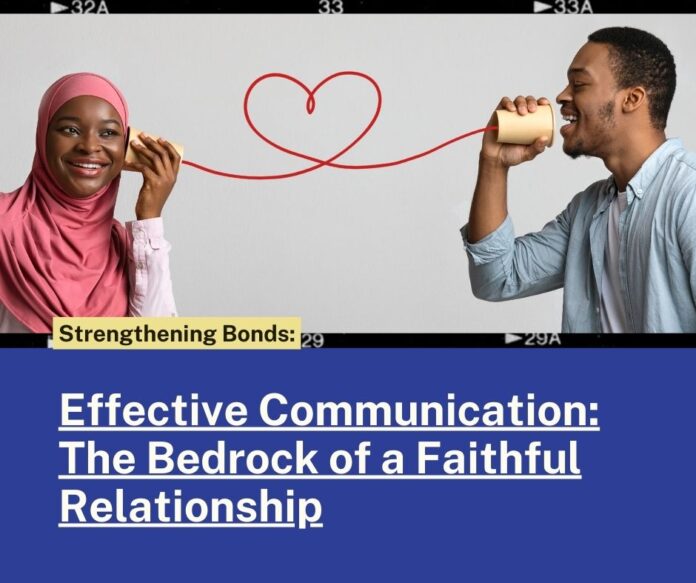Last Updated on May 2, 2024 by Silvy
Effective Communication: The Bedrock of a Faithful Relationship
Let’s face it, infidelity is a common concern that plagues many relationships. It can be a devastating blow, shattering trust and leaving emotional scars that take years to heal.
But before you resign yourself to a life of constant suspicion, there’s a powerful tool at your disposal: effective communication.
Think of your relationship as a beautiful garden. Without proper communication, it becomes overgrown with weeds of resentment, unmet needs, and unspoken desires.
But with clear and consistent communication, you can cultivate a haven of trust, intimacy, and emotional fulfillment – a place where infidelity simply has no room to grow.
In this comprehensive guide, we’ll delve deep into the world of communication and explore its role in preventing infidelity.
We’ll equip you with practical strategies to:
- Express your needs and desires effectively
- Actively listen to your partner
- Navigate difficult conversations with empathy and respect
- Build a foundation of trust and emotional intimacy
- Maintain a healthy and fulfilling relationship
So, grab a metaphorical cup of tea (or coffee, if that’s your thing!), settle in, and get ready to unlock the secrets of communication that can safeguard your love story.

Why Communication is the Antidote to Infidelity
Infidelity rarely blooms out of nowhere. Often, it stems from a deeper disconnect within the relationship.
When partners feel unheard, unseen, or emotionally distant, they might seek validation or connection elsewhere.
Here’s where communication comes to the rescue:
- Open communication fosters trust. By expressing your thoughts and feelings honestly, you create a safe space for your partner to do the same. This transparency builds a bedrock of trust, making it less likely for either of you to stray.
- Effective communication builds intimacy. Talking openly about your desires, fears, and dreams deepens your emotional connection. You get to know each other on a deeper level, fostering a sense of closeness that makes infidelity seem far less appealing.
- Communication helps identify and address underlying issues. Relationship problems, like unmet needs or unspoken resentments, can fester and create distance. By talking things through, you can address these issues head-on, preventing them from morphing into justifications for infidelity.

The Art of Expressing Yourself: How to Get Heard (Without Sounding Naggy!)
Let’s be honest, sometimes expressing ourselves clearly can feel like trying to herd cats. But fear not!
Here are some tips to ensure your message lands gracefully (and gets heard!):
- Focus on “I” statements. Instead of accusatory pronouncements like “You never listen to me!”, try “I feel hurt when we don’t have time to talk.” This approach takes ownership of your feelings and encourages a more constructive dialogue.
- Specificity is key. Don’t leave your partner guessing. Instead of a vague “We need to talk,” be specific about what’s bothering you. “I’d love to feel more appreciated around the house. Can we brainstorm some ways to share chores more effectively?”
- Timing is everything. Don’t bring up a sensitive topic when your partner is stressed or exhausted. Pick a calm moment when you can both give each other your full attention.

The Magic of Listening: How to Truly Hear Your Partner’s Heart
Communication is a two-way street. While expressing yourself is important, actively listening to your partner is equally crucial.
Here’s how to become a master listener:
- Give your partner your undivided attention. Put away your phone, make eye contact, and focus on what they’re saying, both verbally and nonverbally.
- Practice active listening. This means reflecting back on what you’ve heard. Phrases like “So, what you’re saying is…” or “It sounds like you’re feeling…” show that you’re paying attention and trying to understand their perspective.
- Resist the urge to interrupt or offer solutions. Sometimes, your partner just needs a listening ear, not a quick fix. Let them express themselves fully before offering your thoughts.

Beyond Words: The Power of Nonverbal Communication
Communication isn’t just about what you say – it’s also about how you say it. Your body language and tone of voice can convey volumes.
Here’s how to ensure your nonverbal communication is sending the right message:
- Maintain eye contact. Looking away can imply boredom or disinterest. Make eye contact to show that you’re engaged and interested in what your partner has to say.
- Use open body language. Crossed arms or a closed posture can create a barrier. Lean in slightly, uncrossed your arms, and face your partner directly to show openness and receptiveness.
- Soften your tone. A harsh or accusatory tone will put your partner on the defensive. Speak in a calm and gentle voice.
Navigating Difficult Conversations: When Things Get Rough
Let’s face it, disagreements and conflicts are inevitable in any relationship. However, how you navigate these rough patches can make all the difference.
Here are some tips for tackling difficult conversations with grace:
- Choose your battles wisely. Not every minor annoyance needs a full-blown discussion. Pick your battles and focus on issues that truly matter.
- Focus on problem-solving, not blame-placing. Instead of finger-pointing, approach the conversation with a collaborative spirit. Ask open-ended questions like “How can we work together to solve this?”
- Acknowledge your partner’s feelings. Even if you disagree with their perspective, validate their emotions. Phrases like “I understand why you’re upset” can go a long way in de-escalating the situation.
- Take breaks if needed. If emotions are running high, it’s okay to take a short break to cool down. Come back to the conversation when you can both approach it with a calmer head.
Building a Foundation of Trust and Emotional Intimacy
Communication is the key to building a fortress of trust and emotional intimacy in your relationship.
Here are some ways to foster these essential elements:
- Make time for each other. Schedule regular date nights (even if it’s just a stay-at-home date!), prioritize quality conversations, and find activities you both enjoy.
- Practice appreciation. Express gratitude for your partner and the things they do for you. A simple “thank you” or a genuine compliment can go a long way in strengthening your bond.
- Be present in the moment. Put away distractions like phones or laptops when you’re spending time together. Be fully present and engaged with your partner.
- Maintain healthy boundaries. It’s important to have individual interests and friendships outside the relationship. This can help you maintain a sense of self and prevent codependency.
Keeping the Spark Alive: Maintaining a Fulfilling Relationship
Communication is crucial not only for preventing infidelity but also for keeping the spark alive in your relationship.
Here are some tips:
- Keep things interesting. Try new things together, explore new hobbies, or surprise each other with small gestures of affection.
- Maintain physical intimacy. Physical touch is an important part of a healthy relationship. Make time for affection, cuddling, and of course, sex.
- Embrace personal growth. Don’t become stagnant as a couple. Encourage each other to pursue personal goals and interests.
- Celebrate each other’s successes. Be each other’s biggest cheerleaders. Celebrate your partner’s accomplishments, both big and small.

Conclusion: Communication – The Key to a Thriving Relationship
By prioritizing effective communication, you can cultivate a relationship that is not only faithful but also deeply fulfilling.
Remember, communication is a continuous journey, not a one-time destination. Keep practicing these strategies, nurture your emotional connection, and watch your love story blossom!
FAQs
What if my partner isn’t interested in talking about our problems?
This can be frustrating, but don’t give up. Try picking a time when your partner is relaxed and receptive. You can also suggest couples therapy as a neutral space to have these important conversations.
How can I tell if my communication style clashes with my partner’s?
Sometimes, people have different communication styles. One person might be more direct, while the other prefers a gentler approach. Talking openly about these differences and finding a way to communicate that works for both of you is key.
What if I’ve already experienced infidelity in my relationship?
Rebuilding trust after infidelity takes time and effort. Communication is even more crucial in this situation. Consider seeking professional help from a couples therapist who can guide you through the healing process.
Are there any resources that can help me improve my communication skills?
There are many resources available online and in libraries that offer tips on communication in relationships. Books like “The Five Love Languages” by Gary Chapman or “Hold Me Tight” by Sue Johnson can be helpful starting points.
How often should we be communicating in our relationship?
There’s no magic number. The key is to make sure you’re communicating regularly and effectively. Aim for quality conversations over quantity. Schedule regular check-ins and make time for deeper conversations beyond the daily routine.
By following these tips and fostering a culture of open and honest communication, you can create a relationship that is strong, resilient, and filled with love.
Disclaimer: The information provided in this blog post is for general informational purposes only and should not be construed as professional advice.
Always seek the advice of a qualified mental health professional for any concerns you may have about your relationship.
Reference Links:
- The Five Love Languages by Gary Chapman: https://5lovelanguages.com/
- Hold Me Tight: Seven Conversations for a Lifetime of Love by Sue Johnson: https://www.goodreads.com/en/book/show/2153780
- HelpGuide – Effective Communication for a general overview of communication skills: https://professional.dce.harvard.edu/blog/8-ways-you-can-improve-your-communication-skills/
- Verywell Mind – Communication in Relationships for additional tips on healthy communication in couples: https://www.forbes.com/health/wellness/how-to-communicate-in-a-relationship/
- American Association for Marriage and Family Therapy for finding a qualified couples therapist: https://www.aamft.org/




